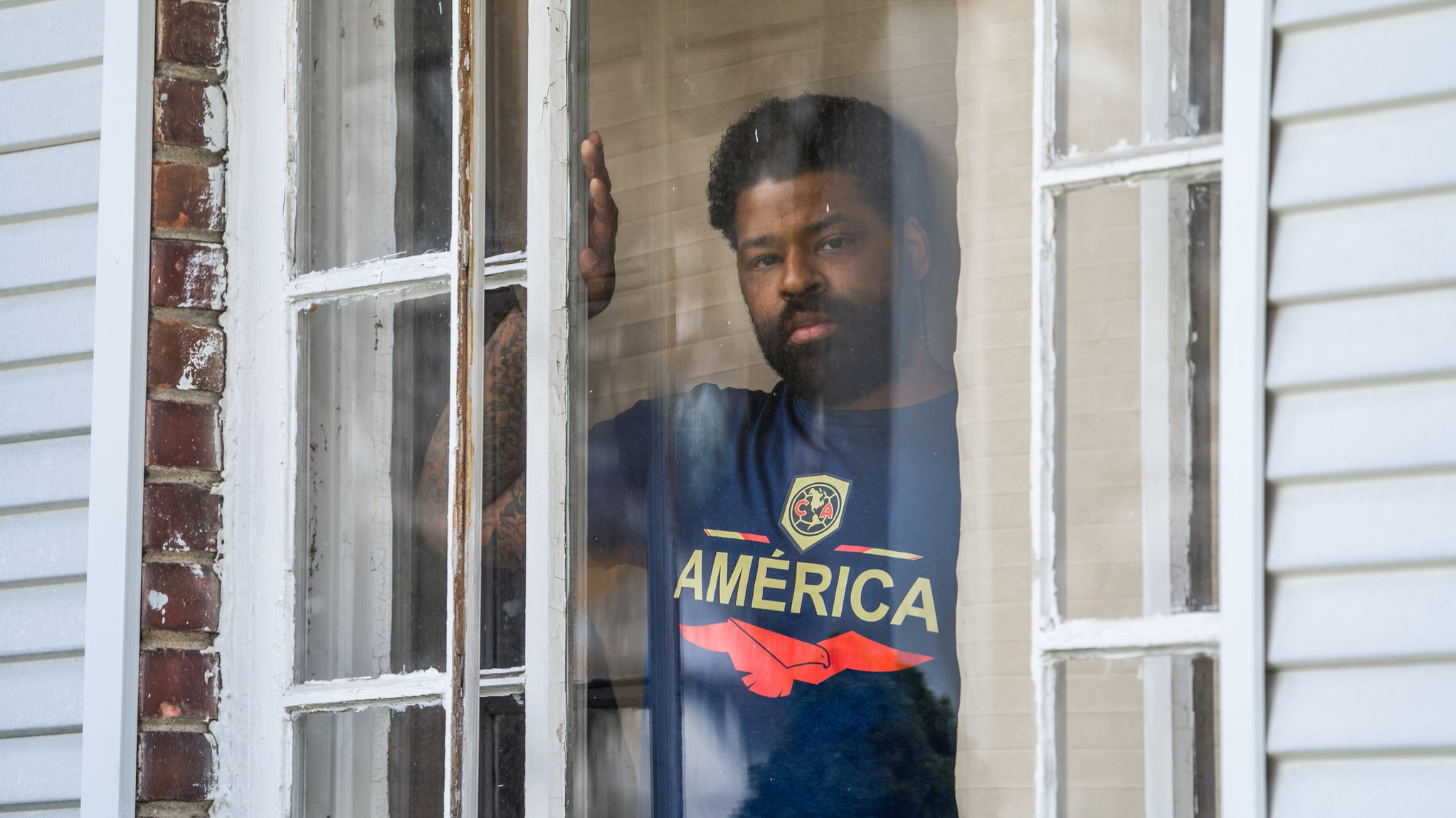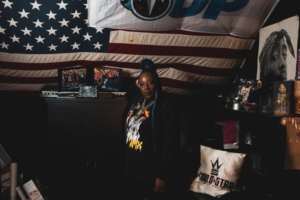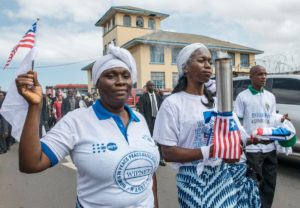DETROIT – The man who raised Keith Gambrell, who loved him like a son and married his mother, died in a blue recliner of novel coronavirus in his Michigan home.
Gary Fowler, 56, went to the emergency rooms of three metro Detroit hospitals in the weeks leading up to his death, begging for a coronavirus test, begging for help because he was having difficulty breathing, but he was repeatedly turned away, Gambrell said.
“My dad passed at home, and no one tried to help him,” Gambrell, 33, said through tears. “He asked for help, and they sent him away. They turned him away.”
In the hours before his death, breathing was so difficult, Fowler slept sitting up in the bedroom chair, while his wife, Cheryl, dozed in the bed by his side. When she woke, her husband of nearly 24 years was gone.
Before he took his last breaths, Fowler scrawled on a piece of paper, “Heart beat irregular … oxygen level low.”
“My little brother called me, screaming, ‘Daddy won’t wake up!’ ” Gambrell said.
By the time Gambrell got across town to their house on the morning of April 7, police and emergency medical workers had arrived.
His dad was still in the recliner. A bluish tinge had settled on his lips and fingers.
“I went up and talked to him,” Gambrell said, his voice breaking. “I told him I love him and that I’ll see him again one day and that I’m sorry we couldn’t even have a funeral for him.
“I just felt so bad because he was begging for his life, and medical professionals did nothing for him.”
The virus has brought renewed attention to health disparities for people of color.
“About 33% of the cases of COVID-19 in this entire state of Michigan are in African Americans, and about 40% … of the deaths,” Dr. Joneigh Khaldun, the chief medical executive for the Michigan Department of Health and Human Services, said during a Facebook Live interview Thursday with Detroit’s Civil Rights, Inclusion and Equal Opportunity Department. “And that’s incredibly concerning. We know that African Americans are only about 14% of the entire population.”
Gambrell lives in Detroit’s 48235 ZIP code, a coronavirus hot zone with the highest infection rate per capita – 162 cases per 10,000 residents – and the highest number of confirmed cases of the virus at 724, according to data released Friday by the city.
Denise Fair, Detroit’s chief public health officer, said coronavirus testing remains a barrier for many in the community, as does access to care.
“It’s estimated that there are upwards of 10 people with undetected infections for every confirmed case, and in some communities, the estimates are even higher,” she said.
Health disparities turn deadly
Dozens of factors feed the health disparities for people of color, said Khaldun, who formerly worked as the director and health officer for the Detroit Department of Health.
“It’s a contagious disease,” she said. “That’s the bottom line. And people who have chronic conditions, asthma, diabetes are more likely to get the disease and then have more severe illness.”
In Detroit – the biggest majority-black big city in America – rates of many of those chronic conditions are higher than the rest of the state, making Detroiters especially vulnerable. Add poverty to the mix, Khaldun said, and it’s the perfect recipe for rapid-fire spread.
For many of the city’s poor, it’s impossible to practice social distancing and stay home because they are more likely to hold low-wage jobs in grocery stores, gas stations and other work in services that are considered essential and still operating through the crisis.
“People who are more likely to be underprivileged and people of color, living in poverty, are more likely to get sick from this disease,” Khaldun said. “I think it’s quite simple, actually. And I think we’ll see that once we get more data and start doing the analysis.”

When people in poverty get the disease, Khaldun said, isolating from others in a household might not be possible, increasing the chances that the virus will spread through entire families.
Beyond the economic drivers that make the black community more vulnerable in this pandemic, there’s bias within the medical community, Khaldun said.
That bias might play a role in who gets a COVID-19 test, who gets hospitalized and whose symptoms are taken seriously.

“I’m a doctor, and my own doctor did not listen to my concerns about a headache after I had my first child,” she said. “And I ended up in an ICU (intensive care unit) with a head full of blood. … My own doctors did not listen to me. … We know there’s often delays in diagnosis for all kinds of medical conditions in the black community and people of color. So are there delays in testing? Are there delays in treatment? Are we sending people home when they really should be admitted to the hospital because they’re so at risk for deteriorating quickly? So those are the types of things that we’re going to have to look at.”
“We just thought he had the flu,” Gambrell said. But that afternoon, it was clear to them all that David’s illness was serious – he’d passed out in the bathroom.
They called 911, and an ambulance took David to Henry Ford Hospital in Detroit, where he was admitted. He tested positive for the virus and was put on a ventilator.
“The following week, my father started developing a cough,” Gambrell said, “and the cough was getting worse and worse by the hour.”
In the last week in March, Gary Fowler spiked a fever, too, and his breathing became labored. He went to Beaumont Hospital in Grosse Pointe for help, Gambrell said.
“He tells them, ‘My father has the coronavirus. I would like to get a test because I am showing symptoms. I am coughing,’ ” Gambrell said. “He had a fever of 101. He had shortness of breath. He was showing all the signs.
“They tell him, ‘Sir, more than likely the fever is from bronchitis.’ And they tell him to go home. But they also give my dad a piece of paper saying to act like you have the virus.”
Gary Fowler was not tested for COVID-19. He followed the instructions and went back home.
The same scenario played out at several other hospitals in the days that followed as Fowler continued to seek medical care, knowing his body was starting to fail.
After going to Detroit Receiving Hospital, Fowler was told he’d get better care at Henry Ford.
When he arrived at Henry Ford, Gambrell said his father explained, ” ‘My chest hurts. I can’t breathe. I have a fever that has not broke. I’ve been taking Tylenol, I’ve been drinking stuff, and it is not breaking. I think I have the virus because my father tested positive for it, and I saw him … the day he went to the hospital.’
“But it was the same thing. They tell him, ‘You’re fine. You have bronchitis. Go home. Drink water. Act like you have the virus.’ “
Gary Fowler was never tested. He was never admitted to any hospital or given any treatment, his son said, perplexed by the way each hospital turned away his father in his moment of need.
“If I have to act like I have a virus, does that mean I have a virus, and you guys are sending me home until I’m on my deathbed?” Gambrell asked. “And then, when I come back to the hospital, it’s too late?
“I honestly think that’s why the death rate for blacks is so high. It’s because we’re being pushed to the back and told to go home, but come back if you can make it before you die.
“That shouldn’t be the medical procedure for anything.”
Beaumont issued a statement after questions about how Gary Fowler was treated:
“COVID-19 is hitting southeastern Michigan particularly hard. As patients come to Beaumont for care during this extraordinary time, we are doing all we can to evaluate, triage and care for patients based on the information we know at the time. When making care decisions, we do not discriminate against anyone based upon their gender, race or any other factor. We grieve the loss of any patient to COVID-19 or any other illness.”
Henry Ford Health System said Saturday that no one who comes to the hospital is denied care.
“All patients who come to our emergency departments receive care and assessment,” said Brenda Craig, vice president of integrated communication at Henry Ford Health System. “Some patients will meet criteria for admission at the time, while others may not. In the case of COVID-19, we have a multistep triage process. As patients arrive to our emergency department, all are screened for COVID-19 symptoms. Those with mild or moderate symptoms who do not meet admission criteria at the time they present may be sent home with strict instructions to return immediately if symptoms worsen.
“Our thoughts and prayers are with the Fowlers and all families devastated by the effects of COVID-19. We’re not able to share details due to patient privacy, but we don’t take lightly any concerns of biased care, given our dedication to putting patients first. Throughout this pandemic, we have followed CDC (Centers for Disease Control and Prevention) guidelines related to testing and clinical care protocols. Henry Ford has also been a leader in addressing health disparities and driving true health equity as part of our core mission and values, and that work will continue.”
Craig acknowledged that testing for coronavirus remains limited.
“Given the U.S. currently does not have the ability to widely expand testing to everyone, the CDC has issued guidelines to health systems to prioritize testing,” she said. “We’ve followed these guidelines closely, whereby patients who are currently admitted and health care workers experiencing symptoms are among those receiving top priority for testing.”
Even though his father never had a COVID-19 test, Gambrell said his dad’s death certificate says he died of the virus.
“There’s no question,” he said.




